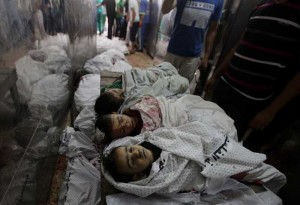
UN High Commissioner for Human Rights Navi Pillay Wednesday warned that Israeli military attacks on Gaza could constitute a war crime, as the toll in Israel’s ongoing offensive on the Palestinian enclave rose to over 650.
Pillay told a special session of the UN Human Rights Council in Geneva that independent reports on the Israeli attacks indicated “a strong possibility that international humanitarian law has been violated, in a manner that could amount to war crimes”, Efe news agency reported.
The top UN official, who also branded as “unacceptable” the indiscriminate rocket attacks by Palestinian militants against Israel, stressed that “the houses of civilians are not legitimate targets unless they are used or contribute to military purposes”.
“When in doubt, the houses of civilians are not legitimate targets,” she said.
Meanwhile, diplomatic efforts to end the conflict continued, as US Secretary of State John Kerry arrived in Israel to meet Prime Minister Benjamin Netanyahu and was expected to travel later to Ramallah for talks with Palestinian leader Mahmoud Abbas.
Kerry landed at an Israeli military airport after the US and European countries suspended all flights to Tel Aviv for 24 hours citing security reasons as a Palestinian rocket fell near the Ben Gurion Airport.
The US secretary of state is also expected to meet in Jerusalem with UN Secretary General Ban Ki-moon, who has travelled to the area in an attempt to secure a humanitarian truce that will allow negotiations for a permanent ceasefire between Israel and the Palestinian movement Hamas.
Meanwhile, Israel’s large-scale offensive continues to wreak havoc on the Gaza Strip, killing 23 Palestinians and wounding around 230 others Wednesday.
Ashraf al-Qedra, spokesman of the health ministry in Gaza, told reporters that 23 Palestinians were killed, 17 of whom were from the town of Khuza’a in the southeastern city of Khan Younis, Xinhua reported.
Residents and security officials said that Israeli army tanks, stationed east of the small town that is close to the border separating Gaza from Israel, carried out massive attacks on the houses there.
The residents said they appealed to international and local rescue teams to aid them, adding that ambulances were still unable to reach the area to carry out the dead or help the wounded due to the intense tank shelling.
Israeli war jets and tanks rammed missiles and fired shells on various areas throughout the Gaza Strip, while gun battles erupted between Israeli ground forces and Gaza militants in eastern and northern areas.
Meanwhile, the health ministry in Gaza said in a press statement that the death toll since the beginning of the Israeli operation on the Gaza Strip topped 650 Palestinians while 4,300 others were wounded, adding that most are civilians.
Israeli officials said their air strikes were “surgical” and targetted only militants from Hamas, but earlier reports by the UN estimated that around 80 percent of Gaza’s casualties were civilians.
The toll includes children, women, the elderly and the disabled.
A total of 28 Israeli soldiers and two civilians were killed since the Jewish state started its ground invasion in Gaza July 8, according to the Israel Defence Forces.
According to another Xinhua report, the sole power plant in central Gaza Strip was forced to stop producing electricity early Wednesday after it was hit by Israeli tank shells.
Fathi Shekh Khalil, deputy chairman of the Gaza-based energy corporation, said in a press statement that several tank shells landed in the surroundings of the plant, and caused damaged to the generators.
He also said engineers and technicians with Gaza Energy Corporation were currently unable to get into the plant to fix the problems, adding that they were waiting for the Red Cross in order to reach the area.
Apart from that, Khalil noted that the severe lack of fuel also contributed to the electricity outage in the Gaza Strip.
The complete power outage in Gaza has further intensified an already rapidly growing humanitarian crisis on the ground.
“Being without electricity, it would certainly affect the humanitarian services offered to the populations during the war on Gaza, mainly hospitals, water and sewage systems,” said Sheikh Khalil.